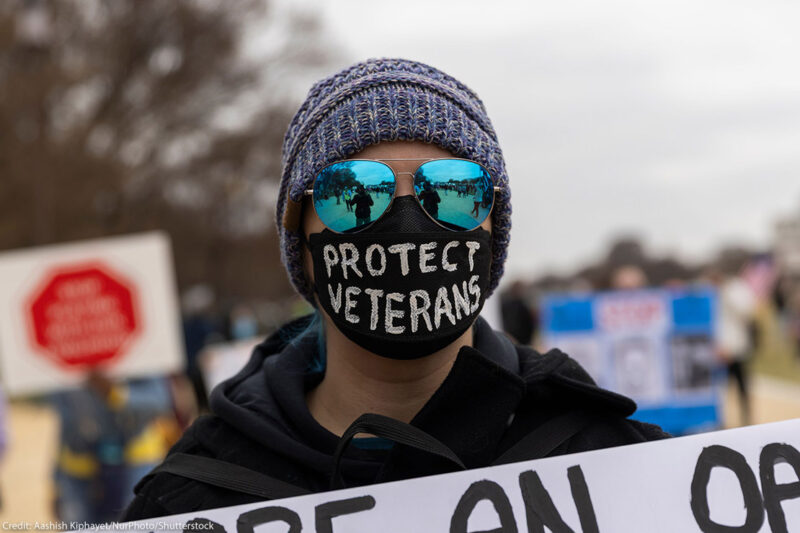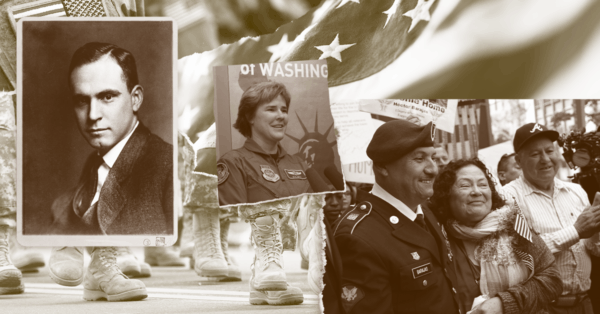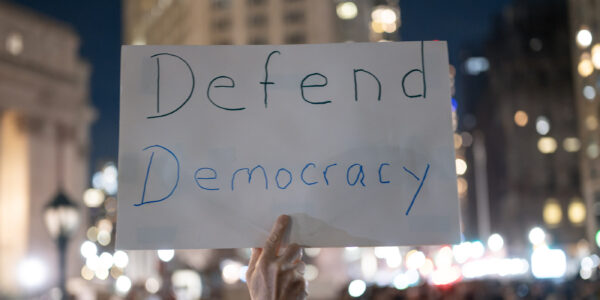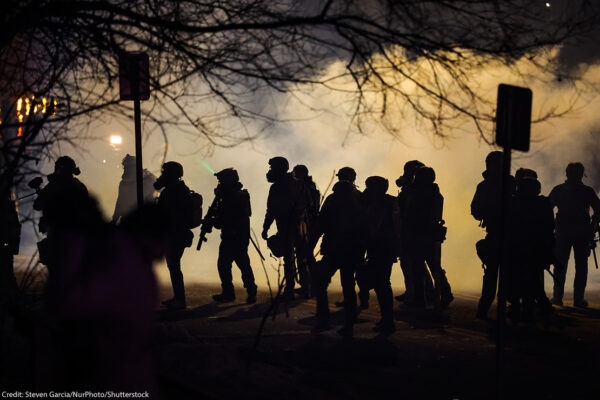Defending Veteransâ Rights for Over a Century


The šėÐÓĘÓÆĩ marks this Veterans Day with a continued commitment to advancing the rights of veterans, servicemembers, and their families. We have a long, proud history of litigation and advocacy on behalf of those who serve, as reflected in a new report released today.
Our commitment to the fundamental freedoms of veterans, servicemembers, and their families is unwavering. Military life in many ways can mirror civil society, often making explicit the segregation, discrimination, and other indignities of the time. By breaking down barriers in the military, we ensure that those who serve their country are treated fairly. And, in doing so, we challenge the assumptions that undergird similar forms of unfairness in civilian life as well.
Dissent and Discrimination: Early Battles for Equality and Justice in the Military
In 1917, as the United States prepared to enter World War I, Congress passed the Selective Service Act requiring men to register for the draft and leaving few avenues to object based on sincerely held religious beliefs.
Around the same time, Roger Nash Baldwin founded the National Civil Liberties Bureau to protect the rights of war dissenters and conscientious objectors. That organization soon became the šėÐÓĘÓÆĩ, and our defense of war opponents helped cement the šėÐÓĘÓÆĩâs reputation as a champion of liberty for both civilians and service members.

100+ Years Fighting for Veterans, Servicemembers, and their Families

100+ Years Fighting for Veterans, Servicemembers, and their Families
From the 1940s to the 1970s, the šėÐÓĘÓÆĩ took on some of the most consequential cases affecting veterans and servicemembers. In 1942,âŊtheâŊšėÐÓĘÓÆĩâŊrepresented Winfred Lynn,âŊaâŊBlack man,âŊwhoâŊresponded to hisâŊdraft noticeâŊby defiantlyâŊstatingâŊthat he was âready to serve in any unit of the armed forces of my country which is not segregated by race.ââŊThis case was a contributing factor in PresidentâŊHarryâŊTruman's 1948âŊexecutiveâŊorder ending racial segregation in the military.
Thirty years later, we fought to uphold the rights of pregnant servicemembers, , most notably in the landmark case ofâŊStruck v. Secretary of Defense, which challenged the Air Force policy requiring people in the service who were pregnant to have an abortion or be discharged. The case forced the Air Force to change its policy.
At the same time, in the 1970s, the šėÐÓĘÓÆĩ also represented a gay servicemember in his attempt to serve openly and pursued changes to allow women to serve on equal terms as men in the armed forces.
These battles, some of which made it all the way to the Supreme Court, helped break down gender and race barriers in the military. Ruth Bader Ginsburg, as a founding director of the šėÐÓĘÓÆĩ Womenâs Rights Project, was one of the key legal minds advancing these and other fights on behalf of women during the 1970s.
Beyond Donât Ask, Donât Tell: Veteransâ and Servicemembersâ Civil Liberties in the Modern Era
Throughout the latter half of the 20th century, the šėÐÓĘÓÆĩ also attended to the needs of veterans, addressing inequities in the militaryâs discharge system. In the 1970s, our Veterans Education Project published the âšėÐÓĘÓÆĩ Practice Manual on Military Discharge Upgrading,â and we launched a national telephone hotline to connect veterans with assistance to upgrade their discharges.
Today, fights over who has the right to serve continue. We fought Donât Ask, Donât Tell, which banned lesbian, gay, and bisexual troops from serving openly in the military until it was repealed in 2010. We also worked to expand access to military academies for women and parents, represented military whistleblowers like Chelsea Manning, and defended the free speech and voting rights of servicemembers and veterans when they came under threat.
Under the first Trump administration, servicemembers and veterans faced an onslaught of attacks. Cruelly, the Trump White House banned transgender people from serving in the military, regardless of their ability and willingness to serve. We filed suit on behalf of affected servicemembers who were discharged based on their gender identity, and saw the ban lifted. Trump recently reinstated the ban.
When the first Trump administration sought to undermine the expedited pathway to citizenship for immigrants who served, we sued. Our advocacy in support of veteran-led organizing has helped bring as many as 175 deported veterans back home.
But as far as weâve come, thereâs still work to do. Black people, other people of color, women, and additional marginalized communities are still underrepresented in military academies and officer ranks. Transgender people are now excluded altogether from service. Veterans are still subject to deportation despite their service, and those who remain in our country face disproportionate rates of homelessness and incarceration.
Just as these inequities persist, so does our dedication to demanding better. The šėÐÓĘÓÆĩ is in courts in Congress to fight for a military that reflects our countryâs values of fairness, equality, and justice.


